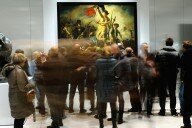When my professor told the class to listen to a commencement speech we would need to know for the exam, I figured it was just the typical “go make something of your life” nonsense we usually hear at graduation ceremonies. But the speech titled “This is Water” by David Foster Wallace was the likes of something I have never heard before.
If you don’t know what I’m talking about, I strongly suggest you listen to the speech for yourself, or just type the title in on Google and read the transcript alone. If, on the other hand, you’re thinking, “ain’t nobody got time for that” then don’t worry, I’ll fill you in.
The 2005 Kenyan College Commencement Address starts with a small anecdote explaining the title of the speech. “Two young fish are swimming along when they pass an older fish, which nods and says, ‘Morning boys, how’s the water?’ The two young fish swim on until one asks, ‘What the hell is water?’”

He goes on to explain that the meaning behind this quirky little story isn’t one of the “wise older fish teaching the younger fish what water is” types of things, but rather, to show that sometimes “the most obvious, important realities are often the ones that are hardest to see and talk about.”
Wallace says that we often hear that college is less about being filled with blind knowledge and more of “teaching you how to think.” He goes on to denounce this, instead saying, “Learning how to think really means exercising control of how and what you think.”
Most of our brains are naturally set to the idea that we are the center of the universe and everything in our lives revolves around us. When you’re stuck in a 5 p.m. standstill traffic jam or a crowded grocery store with screaming infants that cause an immediate migraine, what is it you think about? Wallace says most of us unconsciously think about ourselves. “It’s MY hunger, MY fatigue, MY desire to get home.”
But when we enter the harsh realities of the “real world” with 9 to 5 jobs, traffic jams and bills to pay, we can choose how to view these seemingly mundane and sometimes horrific activities. We can force ourselves to stop and think that maybe the person who just cut us off is rushing to the hospital to take care of a sick child, or that the woman in the aisle next to you has to bring her screaming baby to Publix because she is a single mom who can’t afford a babysitter. The difference in our emotions and how we look at these tiny activities can result in how we view the success and happiness of our lives.

I personally think we can even take it a step farther. We now live in an interconnected world that is becoming more and more globalized through technology. I believe that if we can consciously choose what to think about, then we can choose to think and help others in every part of the world, instead of becoming more self-absorbed. We can care less about money, power, success and fame and more about caring and sacrificing for others- even if it’s much less glamorous.
Wallace ends by noting, “That is real freedom. That is being educated and understanding how to think. The alternative is unconsciousness, the default setting, and the rat race. The real value of education has nothing to do with knowledge and everything to do with simple awareness.”
It may not always be pretty, but remember, this is water.
Featured photo courtesy of: The Inspiration Room





